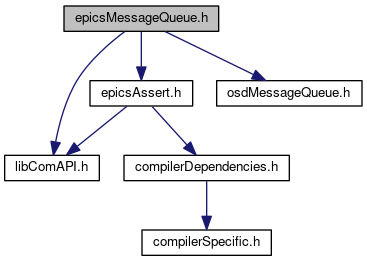|
LIBCOM_API epicsMessageQueueId
epicsStdCall | epicsMessageQueueCreate (unsigned int capacity, unsigned int maximumMessageSize) |
| | Create a message queue. More...
|
| |
|
LIBCOM_API void epicsStdCall | epicsMessageQueueDestroy (epicsMessageQueueId id) |
| | Destroy a message queue, release all its memory.
|
| |
| LIBCOM_API int epicsStdCall | epicsMessageQueueTrySend (epicsMessageQueueId id, void *message, unsigned int messageSize) |
| | Try to send a message. More...
|
| |
| LIBCOM_API int epicsStdCall | epicsMessageQueueSend (epicsMessageQueueId id, void *message, unsigned int messageSize) |
| | Send a message. More...
|
| |
| LIBCOM_API int epicsStdCall | epicsMessageQueueSendWithTimeout (epicsMessageQueueId id, void *message, unsigned int messageSize, double timeout) |
| | Send a message or timeout. More...
|
| |
| LIBCOM_API int epicsStdCall | epicsMessageQueueTryReceive (epicsMessageQueueId id, void *message, unsigned int size) |
| | Try to receive a message. More...
|
| |
| LIBCOM_API int epicsStdCall | epicsMessageQueueReceive (epicsMessageQueueId id, void *message, unsigned int size) |
| | Fetch the next message on the queue. More...
|
| |
| LIBCOM_API int epicsStdCall | epicsMessageQueueReceiveWithTimeout (epicsMessageQueueId id, void *message, unsigned int size, double timeout) |
| | Wait for a message to be queued. More...
|
| |
| LIBCOM_API int epicsStdCall | epicsMessageQueuePending (epicsMessageQueueId id) |
| | How many messages are queued. More...
|
| |
| LIBCOM_API void epicsStdCall | epicsMessageQueueShow (epicsMessageQueueId id, int level) |
| | Displays some information about the message queue. More...
|
| |
- Author
- W. Eric Norum
Each C function corresponds to one of the C++ methods.
Definition in file epicsMessageQueue.h.
| LIBCOM_API int epicsStdCall epicsMessageQueueTryReceive |
( |
epicsMessageQueueId |
id, |
|
|
void * |
message, |
|
|
unsigned int |
size |
|
) |
| |
If the queue holds at least one message, the first message on the queue is moved to the specified location and the length of that message is returned.
If the received message is larger than the specified message size the implementation may either return -1, or truncate the message. It is most efficient if the messageBufferSize is equal to the maximumMessageSize with which the message queue was created.
- Returns
- Number of bytes in the message.
-
-1 if the message queue is empty, or the buffer too small.

 1.8.5
1.8.5